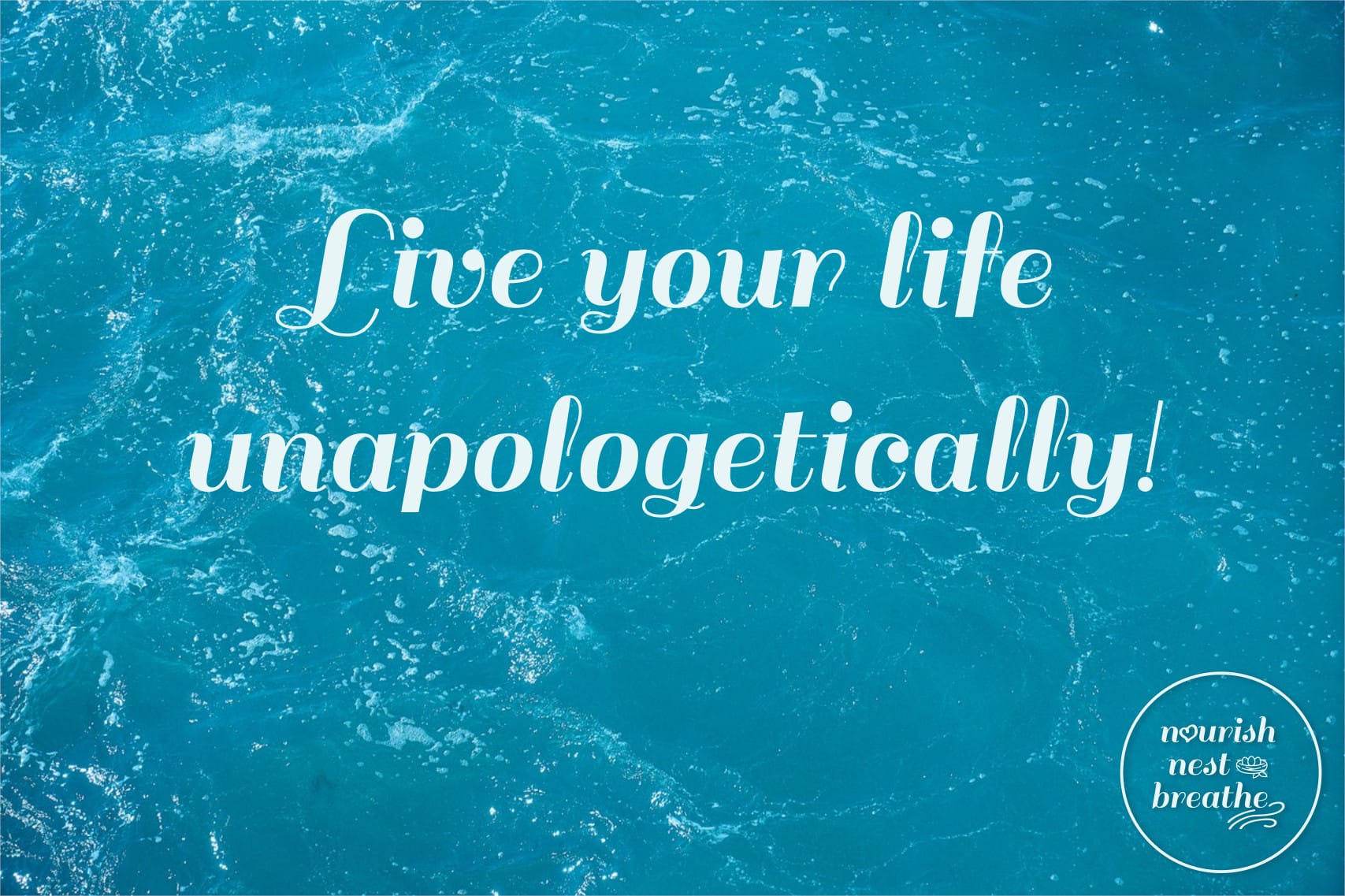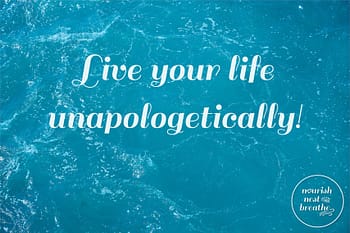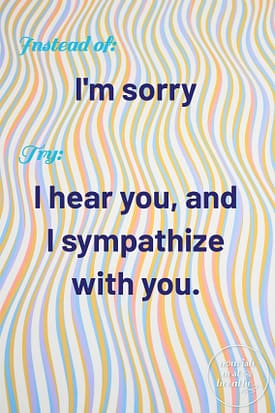
 First, just a clarification – if through your own action or inaction, or what you said or did not say, you intentionally or unintentionally hurt someone else, I absolutely think it is correct to apologize. The important factor in this definition is the connection to your own agency. It is ownership for yourself, for your words and behaviors that results in the need to say “I’m sorry”.
First, just a clarification – if through your own action or inaction, or what you said or did not say, you intentionally or unintentionally hurt someone else, I absolutely think it is correct to apologize. The important factor in this definition is the connection to your own agency. It is ownership for yourself, for your words and behaviors that results in the need to say “I’m sorry”.
However, if the following sounds familiar, then you might have an “I’m sorry” problem. When Adam and I first met, we found we were constantly apologizing to each other. But not because our relationship had a rocky start. If one of us had a tough day at work, we would apologize. If Adam was stuck in traffic on his way to pick me up – I would apologize. When my meal came with cheese on it because I forgot to ask to have it held off – Adam would apologize. It seemed like one of us was constantly saying “I’m sorry”. But here is the problem – we were apologizing for something we had zero control over.
 I HAS
I HAS
When we were saying “I’m sorry”, what we really meant was “wow, that sucks, I wish you didn’t need to deal with that”. So a few weeks into our relationship we sat down to talk about the “I’m sorry” issue. We were both tired of not only saying it, but also hearing it – I didn’t want or need Adam to take responsibility for things beyond his control, nor did he want that from me.
Once we clarified we were on the same page as to what exactly we meant when we said “I’m sorry”, it was time to find a better phrase. We tossed out several ideas, but ended up settling on I HAS. It stands for – “I hear and sympathize”. Through using I HAS we were able to let the other person know that we were actively listening to them – we had heard that they were frustrated or upset by something. We also were able to express that we sympathized with the feelings they had in regards to the situation. And that while we couldn’t change it, we wished they did not have to experience it.
Four years later
We have been using I HAS for four years now. Sometimes I find myself saying it to friends and family before I realize they have no idea what I mean. But that has caused me to be more thoughtful of when I say “I’m sorry” outside of my relationship with Adam. Now I’m just as likely to say – “that’s rough” or “that sucks” or even “I wish you didn’t have to deal with that”. When I say I’m sorry now, often, it means I am apologizing for something that is actually my responsibility – a situation caused by my own agency.
In my relationship with Adam, this has also brought a deeper meaning to “I’m sorry”. Now if one of us says it, we understand it is not just an off-handed comment thrown out to try and gloss over an uncomfortable situation. When one of us apologizes now, we understand there is a level of ownership for the situation at hand, and an intent to prevent it from happening again. It doesn’t mean we never have to apologize, but it does mean that when we do it feels genuine.
Let’s make I HAS go viral!
I wish that I HAS would take off. Does the following conversation sound familiar?
You talking to a friend: I had a tough day at work today – nothing seemed to go right.
Friend: I’m sorry.
You: No need to apologize, it isn’t your fault.
No imagine if you didn’t have to have this conversation on a regular basis with friends and family. What if instead, the conversation went like this:
You talking to a friend: I had a tough day at work today – nothing seemed to go right.
Friend: I HAS. Do you want to talk about it, or would you rather I tell you a funny story about my children/cat/spouse?
You: I don’t want to dwell on it, but I would love to hear a funny story!
Your friend could add that second sentence in after I’m sorry in the first conversation, but we tend to get stuck on the I’m sorry regardless of what comes next. You don’t want your friend to feel bad because you had a bad day, that just amplifies the negative feelings. For me, the issue is not about getting sympathy, it is simply in having my feelings and needs acknowledged by someone I care about.
Practice your boundary muscle
Since implementing I HAS in my relationship with Adam, I have become much more aware of my usage of I’m sorry. And here is what I realized, every time I said I’m sorry but what I really meant was I HAS, what I was doing was taking ownership and responsibility for someone else’s actions/inactions, words/lack of words.
 By being more careful of when I actually say I’m sorry, I am creating healthy boundaries with the world around me. I still try to be careful to own what is mine, but I also try to be careful to NOT own what is not mine. I am no longer trying to fix everything for everyone. By changing my languaging, I was able to change my sense of responsibility.
By being more careful of when I actually say I’m sorry, I am creating healthy boundaries with the world around me. I still try to be careful to own what is mine, but I also try to be careful to NOT own what is not mine. I am no longer trying to fix everything for everyone. By changing my languaging, I was able to change my sense of responsibility.
Now if Adam has a rough day at work or gets stuck in traffic, I can sit down with him, I listen while he talks about it, I sympathize with the situation. When he is done talking about it, I can let it go. It wasn’t my day, and there isn’t anything I can do to fix it (aside from winning the lottery and moving us to a deserted island).
If you are struggling with boundaries of your own, read my post on boundaries here. And try to start listening to how many times you say “I’m sorry” throughout the day. How much are you owning that has nothing to do with you? Try to change just a few of those instances of “I’m sorry” each day to – “I hear what you are saying – that sounds like it was really tough”. See if you feel different walking away from those conversations than the ones where you apologize.
Try journaling on your experiences over a week or two to get some perspective over time without relying on your memory. Play with finding a phrase (or a few phrases) that work for you, that feel comfortable when you say them. And most importantly, just keep flexing that boundary muscle.
Wishing you a day filled with people who listen to and sympathize with what you have to say!
Related
Leave a Reply Cancel reply
This site uses Akismet to reduce spam. Learn how your comment data is processed.